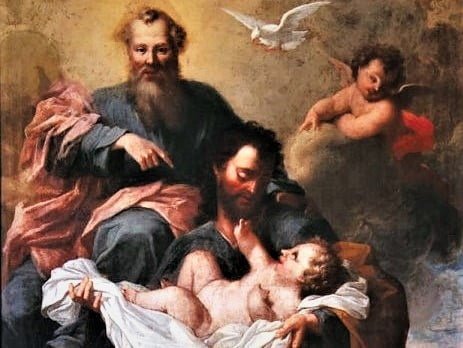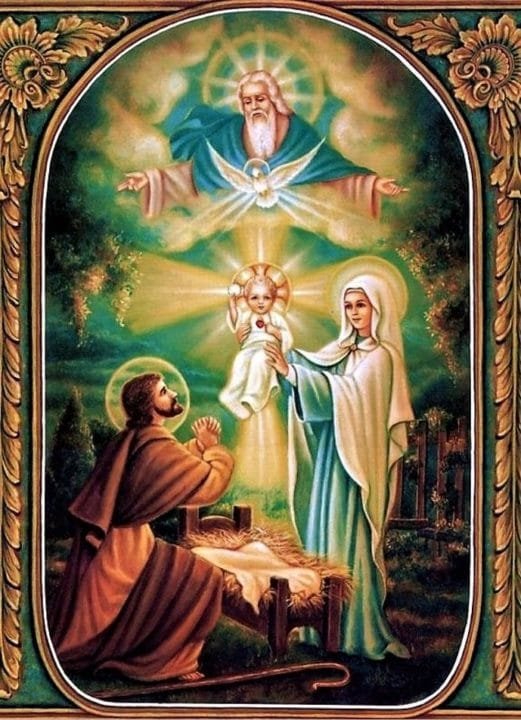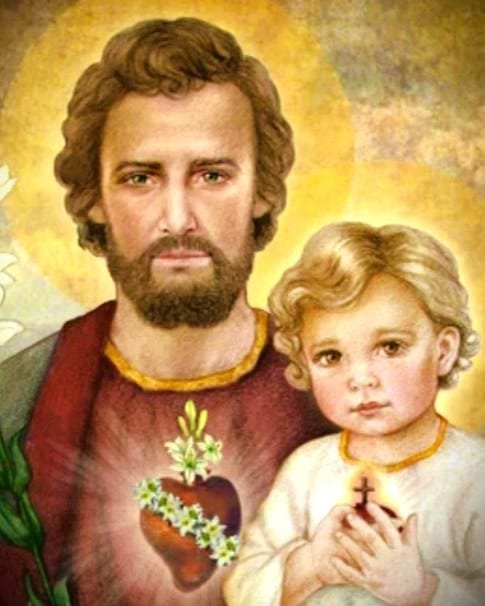ITE AD IOSEPH! GO TO JOSEPH!

F. Fernández-Carvajal, in his Catholic best-seller, In Conversation with God, vol. 4, n. 15, wrote:
Joseph the son of Jacob received from God the gift of being able to interpret Pharaoh’s dreams, and was thus himself forewarned as to what would happen later. The other and greater Joseph also received God’s messages in dreams. Saint Bernard observes that the former was given to understand the mysteries of dreams; the latter deserved to know and to share in the most supreme mysteries (cf St Bernard, Homily on the Virgin Mother, 2).
The first Joseph won the confidence and the favour of Pharaoh and became the overseer of the granaries of Egypt. When famine ravaged the lands of neighbouring peoples and they came to Pharaoh to beg for wheat in order to stay alive, he said to them: Go to Joseph; and what he says to you, do (First Reading, Year I: Gen 41:55). When the whole of those regions were famished, Joseph opened all the storehouses, and sold to all corner from Egypt’s empire… Moreover, all the earth came to Egypt to Joseph to buy grain, because the famine was severe over all the earth.
Now too the entire world is ravaged by hunger, a hunger for doctrine, for piety and love. The Church bids us: Go to Joseph. In the face of all the necessities that we personally suffer, she says to us: Go to the Holy Patriarch of Nazareth.

It is very pleasing to Jesus that we should get to know Joseph and ask for his help. He is the one Jesus loved so much whilst he was on earth and loves so much now in Heaven. He is the one from whom He learned so much and to whom He talked from the moment He could lisp his first words.
I do not remember even now that I have ever asked anything of him which he has failed to grant. I am astonished at the great favours God has bestowed on me through this blessed saint, and at the perils from which he has freed me, both in body and in soul. To other saints the Lord seems to have given grace to succour us in some of our necessities, but of this glorious saint my experience is that he succours us in them all, and that the Lord wishes to teach us that as He was himself subject to him on earth, (for, being his guardian and being called his father, he could command him) just so in Heaven He still does all that he asks…
If I were a person writing with authority, I would gladly describe at length and in the minutest detail, the favours which this glorious saint has grunted to me and to other… I only beg, for the love of God, that anyone who does not believe me will put what I say to the test, and he will see by experience what great advantages come from his commending himself to this glorious patriarch and having devotion to him. Those who practise prayer should have a special affection for him always. I do not know how anyone can think of the Queen of the Angels, daring the time she suffered so much with the Child Jesus, without giving thanks to Saint Joseph for the way he helped them (St Teresa, Life, 6).

For the men and women of today, just as for those of any other age, Saint Joseph represents a dearly loved and venerable figure, whose vocation and dignity we all admire, and for whose faithfulness in the service of Jesus and Mary we thank him. Through Saint Joseph we go straight to Mary, and through Mary, to the source of all holiness, Jesus Christ (Benedict XV, Bonum sane et salutare, 25 July 1920).
He teaches us to speak to Jesus with piety, respect and love: Joseph, blessed and happy man, we say to him in the words of an ancient prayer of the Church, who was permitted to see and hear the God whom many kings wished in vain to see and hear, and not only to see and hear him, but to carry him in your arms, kiss him, clothe him and care for him…, teach us to receive him with love and reverence in Holy Communion; give us a greater sensitivity and finesse of soul.
Saint Joseph, our Father and Lord: most chaste, most pure … You were found worthy to carry the Child Jesus in your arms, to wash him, to embrace him. Teach us to get to know God, and to be pure, to be worthy of being other Christs.
And help us to do and to teach, as Christ did. Help us to open up the divine paths of the earth, which are both hid den and bright; and help us to show them to mankind, telling our fellow men that their lives on earth can be of an extraordinary and continual supernatural effectiveness (J. Escrivá, The Forge, 553).”
SEE AS WELL:
Stay updated: subscribe by email for free TO OUR NEW WEBSITE www.catholicsstrivingforholiness.org (PUT YOUR EMAIL IN THE SUBSCRIBE WIDGET).
We are also in www.fb.com/Catholicsstrivingforholiness. Kindly help more people in their Christian life by liking our page and inviting your family, friends and relatives to do so as well. Thanks in advance and God bless you and your loved ones! Fr. Rolly Arjonillo


